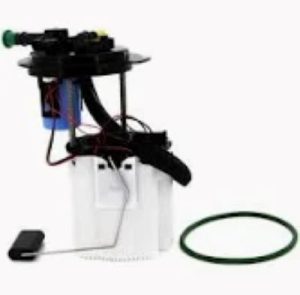Most fuel pumps have a long life and will usually not need to be replaced until somewhere around 100,000 to 150,000 miles of use (though the exact lifespan can vary depending on the quality of fuel you are using regularly). Drivers who use higher-grade fuel and routinely replace their fuel filters will have fuel pumps at the upper end of this growth in their vehicles. In contrast, rigorous driving conditions like off-roading or extreme heat can shorten the life of a fuel pump, meaning that it might need replacing around 80,000 miles or less.
High horsepower vehicles usually require performance fuel pumps, which means they may tend to break down sooner than the average. For a fuel pump that goes into a vehicle with more than 600hp, the driver might have to replace it every 80,000 miles as the demand on it is many times higher pressure and flow rate. Moreover, these high-flow pumps can deliver 400 liters per hour (LPH) or up to two times as much as standard OEM pumps which typically do not let you use more than 200-300 LPH before components start wearing.
Depending on the car model and year, replacing a fuel pump can be costly. Expect to pay for the pump itself (around $400 or more) plus around 2-3 hours labor if you have an economy car. For most, the cost is under a grand at normal repair shops or dealerships with large economies of scale (this tech has been around for over two decades and is all but mastered by now), but on higher-performing or luxury vehicles it can find itself somewhat higher due to the depth they have to go to open up that tank and then even more still for an expensive pump. For instance, a Bosch performance fuel pump can range from $300 or more while an ordinary OEM replacement will cost around $150.
Signs of a failing fuel pump can include sputtering during high speeds, hard starting and degraded fuel mileage. If the pump flows less fuel than what is needed, then this can cause a lean condition, and potentially engine damage. Also, in the above cases, immediate replacement is mandatory failing which it can potentially cause a lot more problems and the repair cost could go up to hundreds or thousands of dollars based on how bad the damage is.

Fuel pumps on cars driven in regions with bad fuel quality or high sediment may also need replacement more often. Impurities in the fuel can also plug-up the internal filter of the pump, impairing its function and subsequent longevity. For this reason, a number of experts suggest replacing the fuel filter every 30,000-50,000 miles to help prolong the useful lifespan of your fuel pump by reducing the work your system has to perform.
Some fleet vehicles, which are prone to greater mileage accumulation than personal-use cars and trucks, have their fuel pumps replaced as a preventive maintenance item. Commercial industries will often enjoy having their fuel pumps replaced as a scheduled part of rutine maintenance every 100,000 miles to prevent surprise debilitating the loss of service. Delivery companies, using average mileage collection data, might anticipate spending $600 per vehicle on fuel pump replacements every 18 months.
Because engines are commonly changed out in performance tuning communities, the fuel pump will be replaced more often than a factory vehicle. Vehicles running higher boost levels with a turbocharger may need an upgraded fuel pump every 60,000 miles to meet the appropriate fuel pressure for peak power. When it comes to applications like these, the inability to upgrade or replace the pump can mean false starvation and subsequently lead to detonation and failure.
If you want to know how long should a Fuel Pump last then please visit the provided link and more information on this.